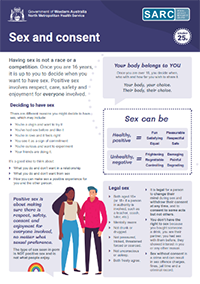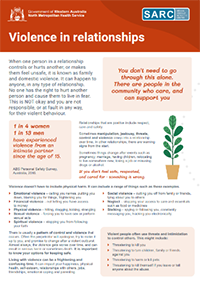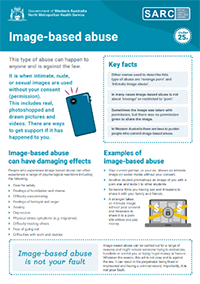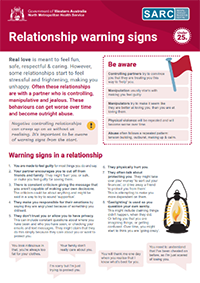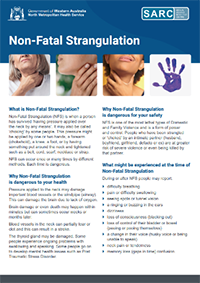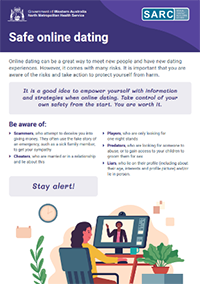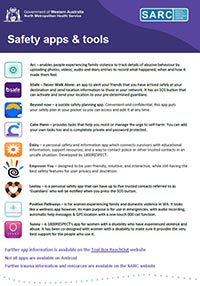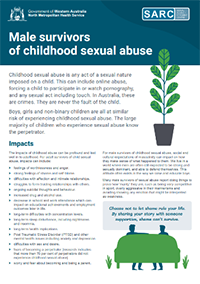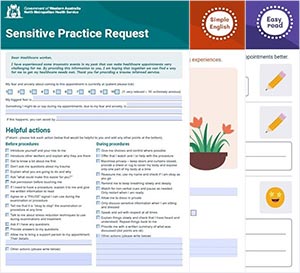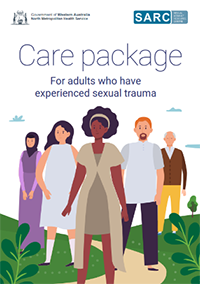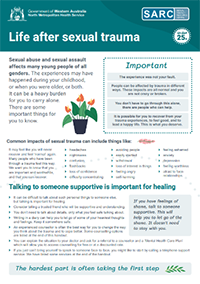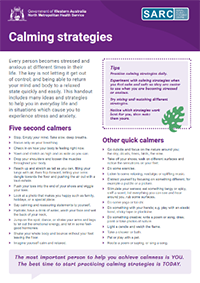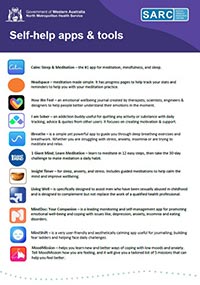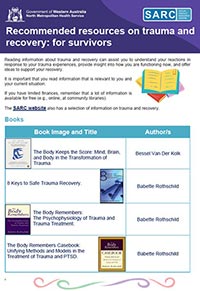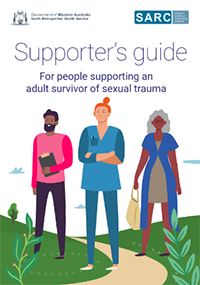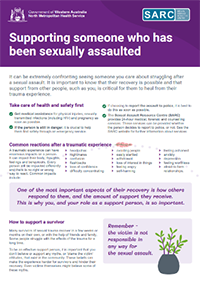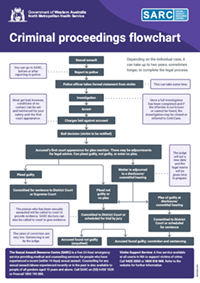Sexual assault, rape, consent and the law
The Sexual Assault Resource Centre (SARC) provides crisis services, support and information to people who have experienced a recent sexual assault (rape) in the last two weeks and counselling for sexual assault / abuse experienced recently or in the past. Find out more about sexual assault, rape, consent and the law below.
- Sexual assault and rape
- Sexual consent
- Image-based abuse
- Violence in relationships
- Common myths about sexual assault
- Child sexual abuse
- Male survivors of child sexual abuse
- Coping after sexual trauma
- Supporting someone after sexual trauma
- Court processes
Sexual assault and rape
Some of the main points about sexual assault and rape are listed below:
- Sexual assault is a crime in Australia
- Sexual assault is never the fault or responsibility of the victim.
- Sexual assault is any sexual behaviour that makes a person feel uncomfortable, scared or threatened and which they didn’t agree (consent) to or were not able to freely agree to (see more about consent below).
- A person can only consent to sexual acts in WA when they are 16 years or older; or 18 years if the other person is in a supervisory role (e.g. teacher, sports coach, religious leader).
- The term rape usually refers to a sexual assault that involves penetration of the vagina, anus or mouth with an object, penis or other body part.
- Sexual assault can happen to anyone. This includes people of any gender, with any sexual preference, who are young or old, from any cultural background, wealthy or not so wealthy, working or unemployed, well-known in the community or not, married or not and of any ability. Anyone can be a victim of sexual assault.
- Most victims know the person who assaulted them. This can include a partner, family member or spouse. Sometimes people are assaulted by a stranger or by more than 1 person.
- The victim can decide whether to report a sexual assault to the police. This can be done at any time. There is no time limit for reporting in Australia.
- There are many services available to support victims of sexual assault. In Perth, SARC is one of the services. Other services are listed in the handout Services in WA (PDF).
Some examples of sexual assault include:
- Putting a penis, object or other parts of the body into someone’s mouth, anus or vagina.
- Being forced to give or receive oral sex.
- Being forced to masturbate or being forced to watch someone masturbate.
- Unwanted sexual touching on private parts of the body.
- Exposing private parts.
- Making someone watch a sexual act or pornography.
Australian sexual assault data can be found at the Australian Institute of Health and Welfare website (external site)
Image-based abuse
Common myths about sexual assault / rape
There are many myths and untruths about sexual assault and sexual abuse / rape. These myths can make it hard for people to recover because they tend to blame the victim and defend or excuse the behaviour of the perpetrator.
Myth: Rape is about sex.
Rape is not about sex. It’s about power, violence and intimidation. This belief minimises the responsibility of the rapist.
Myth: Most sexual assaults occur at night in dark alleys away from others.
Many sexual assaults occur during the day and often in the homes of the people involved. They can also take place in a car or vehicle (including public transport), workplace, school, social venue or religious institution.
Myth: Most sexual assaults are committed by strangers.
8 out of 10 victims of sexual assault are assaulted by someone they know.
Myth: Women who wear revealing clothes are asking to be sexually assaulted.
No one asks or deserves to be sexually assaulted. Women dress to feel comfortable and attractive. They are not dressing to be assaulted.
Myth: Nice women don’t get raped.
There is actually no such thing as a particular kind of woman who gets raped. Women of all ages, classes, races, religions and marital status are raped.
Myth: When a woman says no, she really means yes or that she enjoyed it or even that she asked for it.
Rape is a deeply humiliating and terrifying experience that no woman ever asks for or enjoys.
Myth: Rape is accepted in Aboriginal culture.
No culture finds rape acceptable.
Myth: Men rape because they get sexually aroused and can’t control themselves.
Many rapists have admitted to planning the rape ahead of time. This myth takes responsibility away from the actions of the perpetrator.
Myth: Men cannot be sexually assaulted.
1 in 25 men and 1 in 6 women in Australia over the age of 15 will experience sexual assault violence sometime in their life. The majority of perpetrators are male. 97% of sexual assault offenders recorded by police in 2018 – 19 were male. (Sexual Assault in Australia, Australian Institute of Health and Welfare, 2020)
Myth: A man can’t be sexually assaulted by a woman.
Although men are much more likely to be sexually assaulted by another man/men, some are assaulted by a woman/women.
Myth: A man who sexually assaults another man is gay.
Men who sexually assault other men are usually straight and can be in a relationship with a woman. Sexual assault is about the use of power and control, not about sexual attraction.
Myth: Women make false reports of sexual assault.
Very few people falsely report sexual assault. Research indicates that only 2% – 10% of reports are false and many of these are dropped. Women are more likely to deny or minimise sexual assault experiences than to make them up. (Source: True or false? The contested terrain of false allegations, Australian Institute of Family Studies, 2021)
Myth: If a male victim became erect or ejaculated then he must have wanted or enjoyed the sex.
Erection and ejaculation are normal male bodily responses to physical stimulus. This cannot be controlled. It does not mean he wanted or enjoyed the experience. Sex without consent is a sexual assault.
Myth: Women enjoy being sexually assaulted.
Any form of sexual violence is a frightening and humiliating experience during which the person has no control over what happens. No one enjoys an experience like that.
Myth: If a person did not scream or fight or has no injury, it could not have been a sexual assault.
Despite what you might see on TV, most people do not scream or fight. This is because they freeze. It’s a common reaction for people to become paralysed with fear.
Myth: Rohypnol is used to spike drinks.
Most sexual assaults involving a drink spike involve excess alcohol, not drugs.
Myth: Men who are sexually assaulted will become homosexual.
Sexual orientation is not affected or influenced by sexual assault. Both homosexual and heterosexual men can be assaulted and can be perpetrators of assault.
Myth: Children who are sexually abused become abusers.
The majority of children who have been sexually abused don’t grow up to be abusers.
Myth: It’s a man’s right to have sex with his wife or partner whenever he wants.
Forcing any woman to have sex or perform sexual acts when she doesn’t want to is sexual assault.
Myths about rape distort the truth and focus blame on the survivors / victims. It’s important for all people to challenge myths about sexual assault so that survivors are not made to feel as if it’s their fault and they can receive the support they need while perpetrators are held accountable for their actions.
Child sexual abuse
Child sexual abuse occurs when a child is exposed to or involved in sexual activity that is inappropriate to their age and developmental level. It can be a one-off event or can be lots of things that happen over time.
Child sexual abuse is a crime and is never the fault or responsibility of the victim. It includes circumstances where the child has less power than another person involved, is exploited, or where the child has been bribed, threatened or coerced. It also includes situations where there’s a significant difference between the developmental or maturity level of the child and another person involved.
Some examples are:
- Letting a child watch or read pornography.
- Allowing a child to watch sexual acts.
- Fondling genitals.
- Having oral sex.
- Vaginal or anal penetration.
- Using the internet to find a child for sexual exploitation.
Possible signs of sexual abuse include when a child:
- Acts in a sexualised way that is inappropriate to his/her age.
- Creates stories, poems or artwork about abuse.
- Has pain, bleeding or swelling in the genital area.
- Starts doing things they have grown out of such as crying a lot, bed wetting or soiling and clinging to caregiver.
- Has nightmares or sudden unexplained fears.
- Has a sexually transmitted infection or is pregnant.
(Source: Government of Western Australia’s Department of Communities, Child Protection and Family Support)
What to do if you are concerned about a child
There are a number of things you can do if you have concerns for the safety of a child or children. The Act for kids website (external site) provides more information.
Reporting
If you are a victim of child sexual abuse or if you suspect that child sexual abuse is occurring to someone else, you can report to police or the Department of Communities, Child Protection and Family Support.
Report to police by:
- Calling 131 444
- Contacting Crime Stoppers by calling 1800 333 000
- Reporting at your local police station
Report to Department of Communities, Child Protection and Family Support (CPFS) by:
- Contacting the Central Intake Team on 1800 273 889 or email cpduty@communities.wa.gov.au.
- Contacting the Crisis Care Unit after hours on 1800 199 008
Contact the Child Abuse Unit
The Perth Children’s Hospital Child Protection Unit (CPU) is a specialised, hospital-based service providing medical, forensic, social work and therapeutic services for children and their families when there’s a concern a child has or may have suffered from child abuse. CPU can be contacted by:
- Calling (08) 6456 4300
- Contacting the Crisis Care Unit after hours on 1800 199 008
If you believe a child is in immediate danger or in a life-threatening situation contact the police immediately by calling 000.
The WA police force website has more information about reporting child abuse to the police (external site)
The CPFS website has more information about reporting child abuse to Department of Communities, Child Protection and Family Support (external site)
To find out more about child abuse in Australia visit the WA Child Safety Services (external site)
Male survivors of child sexual abuse
More information and resources for men who are survivors of child sex abuse can be found at the Living Well website (external site).
Supporting someone after sexual trauma
Court processes
In Western Australia sexual assault and sexual abuse are crimes against the State. This means the police and the Director of Public Prosecutions (DPP) decide whether they have sufficient evidence to prove beyond reasonable doubt that a crime has occurred.
If you make a formal statement to the police, you become a witness to the crime. The police or the DPP decide whether they have enough evidence to press charges. If the police don’t lay charges it doesn’t mean they do not believe you. Sometimes there’s not enough evidence to lay charges. This can leave people feeling disillusioned and denied justice. It can help to talk about these feelings with a counsellor or advocate.
Going to court can make you feel empowered, but it can also be a confusing and frightening experience. You can talk to someone at Victim Support Services to get information about the court proceedings. Victim Support Services (external site) also have support workers who can go to court with you.
Trials usually take place in the District Court, unless the offender is under 18 years of age. It can take up to two years between the time of the initial report to the police and the trial. Some cases don’t go to trial because there’s not enough evidence. This doesn’t mean you were not believed.
Regardless of the outcome of the trial, people often feel better knowing they were able to speak out about their experience, even if the verdict is not guilty.
SARC staff respect and support ANY decision you make, regardless of whether you decide to go to the police or not.


